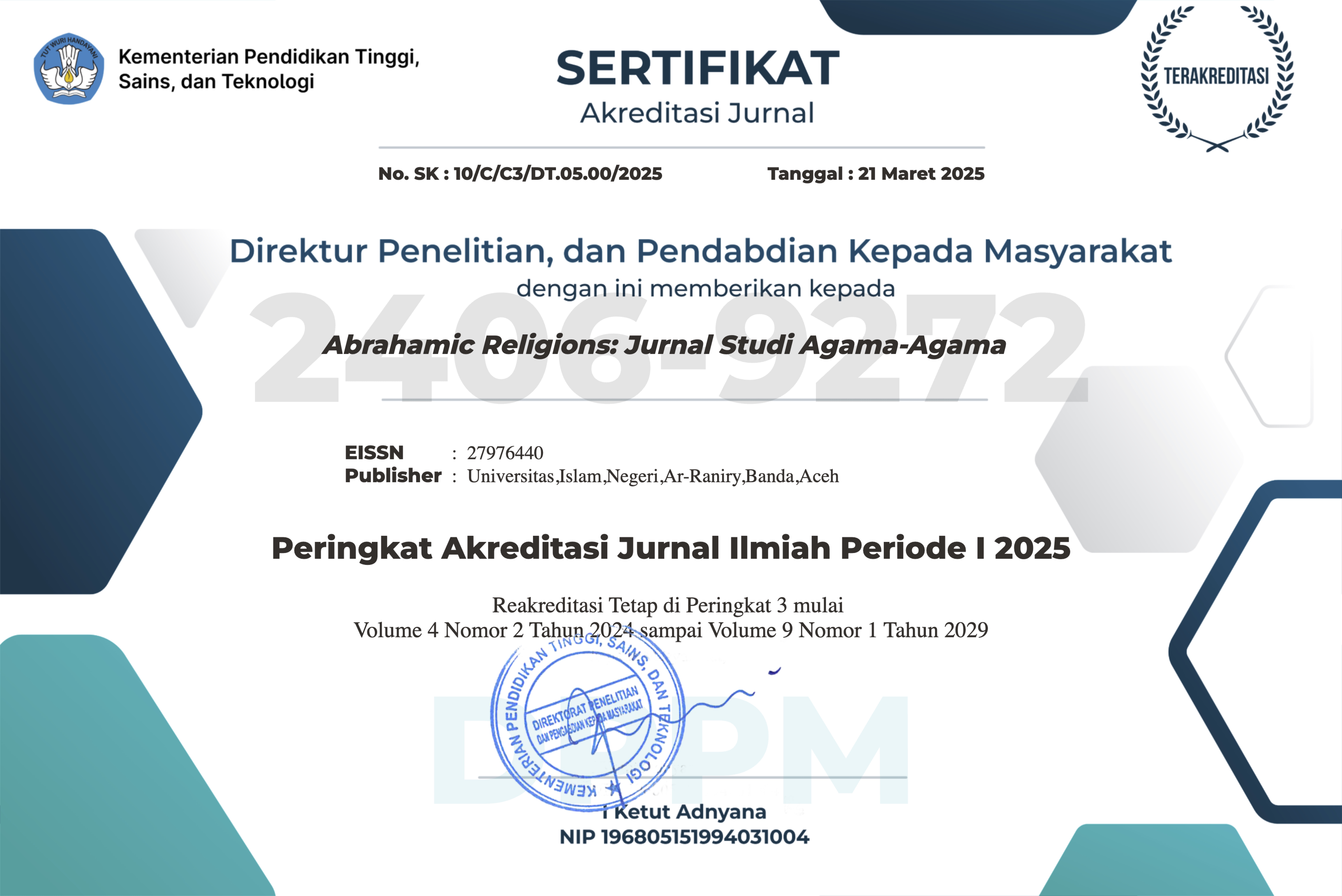Religious Trauma Syndrome (RTS): Examining the Origins of Trauma in Religious Practice and Pathways to Recovery
DOI:
https://doi.org/10.22373/arj.v5i2.31759Keywords:
Religious Trauma Syndrome, Altruism, Spiritual DogmaAbstract
Religious Trauma Syndrome (RTS) has gained increasing scholarly and clinical attention as reports of psychological and spiritual distress linked to religious environments emerge across diverse contexts worldwide. Introduced by Marlene Winell, RTS refers to symptoms such as guilt, shame, fear of divine punishment, anxiety, and depression that persist beyond the individual’s departure from a religious community. This study seeks to examine the root causes of RTS through a qualitative library research approach, drawing on Winell’s work and recent studies within the past five years. Findings suggest that trauma is more often generated by the interpretation and enforcement of doctrine rather than by religious teachings themselves. Four major contributing factors were identified: pathological altruism, spiritual abuse, fear-inducing dogmatism, and exclusive community pressure. By distinguishing religion as a value system from harmful practices, this study contributes theoretically to the conceptual understanding of RTS and practically to therapeutic, educational, and communal strategies for creating spiritually safe environments.
References
Creswell, J. W., & Poth, C. N. (2018). Qualitative Inquiry and Research Design: Choosing Among Five Approaches. SAGE Publications.
Downie, A. (2022). Christian Shame and Religious Trauma. Religions, 13(10), 925. https://doi.org/10.3390/rel13100925
Exline, J. J., Pargament, K. I., Wilt, J. A., Grubbs, J. B., & Yali, A. M. (2023). The RSS-14: Development and preliminary validation of a 14-item form of the Religious and Spiritual Struggles Scale. Psychology of Religion and Spirituality, 15(4), 592–604. https://doi.org/10.1037/rel0000472
Gubi, P. M., & Jacobs, R. (2009). Exploring the impact on counsellors of working with spiritually abused clients. Mental Health, Religion & Culture, 12(2), 191–204. https://doi.org/10.1080/13674670802441509
Haqqani, S. R. (2018). Fear and faith: The psychological consequences of punitive theology in contemporary Islam. Journal of Religion and Health, 57(3), 1023–1038. https://doi.org/10.1007/s10943-017-0452-9
Jones, T. W., Power, J., & Jones, T. M. (2022). Religious trauma and moral injury from LGBTQA+ conversion practices. Social Science & Medicine, 305, 115040. https://doi.org/10.1016/j.socscimed.2022.115040
Koenig, H. G. (2009). Research on Religion, Spirituality, and Mental Health: A Review. The Canadian Journal of Psychiatry, 54(5), 283–291. https://doi.org/10.1177/070674370905400502
Mosse, D. (2012). The Saint in the Banyan Tree: Christianity and Caste Society in India. University of California Press.
Oakley, B., Knafo, A., Madhavan, G., & Wilson, D. S. (Eds.). (2011). Pathological Altruism. Oxford University Press. https://doi.org/10.1093/acprof:oso/9780199738571.001.0001
Oakley, L., Kinmond, K., & Blundell, P. (2024). Responding well to Spiritual Abuse: Practice implications for counselling and psychotherapy. British Journal of Guidance & Counselling, 52(2), 189–206. https://doi.org/10.1080/03069885.2023.2283883
Pargament, K. I., Exline, J. J., & Jones, J. W. (Eds.). (2013). Religious and spiritual struggles. In APA handbook of psychology, religion, and spirituality (Vol 1): Context, theory, and research. (pp. 459–475). American Psychological Association. https://doi.org/10.1037/14045-025
Perry, S. (2024). Religious/Spiritual Abuse, Meaning-Making, and Posttraumatic Growth. Religions, 15(7), 824. https://doi.org/10.3390/rel15070824
Selbie, J. (2023). Religious Trauma Syndrome: Being raised in fundamentalist religious homes leads to frequently misdiagnosed complex PTSD symptoms. Emergency Medicine: Open Access. https://www.longdom.org/
Shupe, A. (2007). Spoils of the Kingdom: Clergy Misconduct and Religious Community. University of Illinois Press.
Winell, M. (2011). Leaving the Fold: A Guide for Former Fundamentalists and Others Leaving Their Religion. New Harbinger Publications.
Zamperini, A., Menegatto, M., Mostacchi, M., Barbagallo, S., & Testoni, I. (2020). Loss of Close Relationships and Loss of Religious Belonging as Cumulative Ostracism: From Social Death to Social Resurrection. Behavioral Sciences, 10(6), 99. https://doi.org/10.3390/bs10060099
Downloads
Published
Issue
Section
License
Copyright (c) 2025 Muammar Iqbal Ma'rief, Relung Fajar Sukmawati

This work is licensed under a Creative Commons Attribution-ShareAlike 4.0 International License.
Authors who publish in this Journal agree to the following terms:
- Authors retain copyright and grant the journal right of first publication with the work simultaneously licensed under Attribution-ShareAlike 4.0 International (CC BY-SA 4.0) allows others to share the work with an acknowledgment of the work's authorship and initial publication in this journal.
- Authors are able to enter into separate, additional contractual arrangements for the non-exclusive distribution of the journal's published version of the work (e.g., post it to an institutional repository or publish it in a book), with an acknowledgment of its initial publication in this journal.
- Authors are permitted and encouraged to post their work online (e.g., in institutional repositories or on their website) prior to and during the submission process, as it can lead to productive exchanges, as well as earlier and greater citation of published work. (See The Effect of Open Acces)















